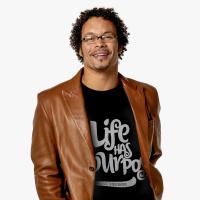Judge Moore, the Founding Fathers, and the Ten Commandments
Can There be any Doubt . . . about history?
I'd like to ask you a question. Take a look at the painting at the right. It may not be immediately apparent to you what this is a painting of . . . or what the painting means. Now how would you find out? I mean, if you really wanted to know what the painting was all about?The answer is that you would talk to the guy with the mustache. His name is Salvadore Dali. You would want to talk to him because he is the artist who painted the work of art. He knows. Right? He's the one who created it.
With that said, I'd like to ask you another question. What's the meaning of this document? In case you don't recognize it, it's a picture of the Constitution. How would you find out what the Constitution of the United States is really all about? I mean, if you wanted to know.
The answer is that you would talk to the guys in this painting -- or at least hear from them. They're the Founding Fathers -- the ones the signed the Declaration of Independence and authored the Constitution. They would know, wouldn't they?
After all, when it comes to painting you could talk with an art critic but he may be right -- or he may be wrong. And when it comes to figuring out the Constitution and what this country is really all about you could talk with a Constitutional Scholar or a historian -- but it's still not the same thing as hearing from the ones who actually did the work.
Now why am I talking to you about paintings, artists, and art critics ... the meaning of America, the Founding Fathers, and modern day scholars. The answer is this man . . . Judge Roy Moore. And this monument -- the Ten Commandments.
There's been a lot of talk these last few days about whether Judge Roy Moore has been un-American in that he's refused to obey a court order to have this statue removed. In fact, this whole argument has pretty quickly gotten to the level of national debate.
Do you know why it's become a national debate? The answer is obvious -- it's a national debate because were debating about the nation. The question at stake is this . . . what is America all about? What's the meaning and purpose of our Republic? What's the foundation of our country and where is it headed?
Is Judge Moore on the right side of that question . . . or the wrong side? Let's turn off the critics, the scholars, and historians (as well as the media guys and the federal judges). Let's listen to the people who actually did the work. You know, the ones who painted the picture of America . . .
"It was the Lord who put into my mind (I could feel his hand upon me) the fact that it would be possible to sail from here to the Indies. All who heard of my project rejected it with laughter, ridiculing me. There is no question that the inspiration was from the Holy Spirit, because He comforted me with the rays of marvelous inspiration from the Holy Scriptures . . . For the execution of the journey to the Indies, I did not make use of intelligence, mathematics or maps. It is simply the fulfillment of what Isaiah had prophesied.. ." -- Christopher Columbus(Book of Prophecies)
"In The Name of God, Amen. . . . Having undertaken for the Glory of God, and the Advancement of the Christian Faith, and the Honour of our King and Country, a Voyage to plant the first colony in the northern parts of Virginia, Do by these Presents, solemnly and mutually in the Presence of God and one another, covenant and combine ourselves together into a civil Body Politick. . ." -- The Mayflower Compact (November 11, 1620)
"The Governor and his six elected officials would "have power to administer justice according to the laws here established; and for want therof according to the rule of the word of God."-- Fundamental Order of Connecticut (1638-39, the Fundamental Orders are considered the direct predecessor to the US Constitution
". . . Let every Student be plainly instructed, and earnestly pressed to consider well, the main end of his life and studies is, to know God and Jesus Christ which is eternal life, , and therefore to lay Christ in the bottom, as the only foundation of all sound knowledge and learning. And seeing the Lord only giveth wisdom, Let every one seriously set himself by prayer in secret to seek it of him. ." -- Rules and Precepts of Harvard University (1642)
"Whereas we all came into these parts of America with one and the same end and aim, namely, to advance the Kingdom of our Lord Jesus Christ and to enjoy the liberties of the Gospel in purity and peace; and whereas in our settling (by wise providence of God) we are further dispersed upon the sea " coasts and rivers than was at first intended." -- New England Confederation (May 19, 1643)
"The colonies are to pursue with peace and loyal minds their sober, serious, and religious intentions . . . in holy Christian faith . . . A most flourishing civil state may stand and best be maintained . . . with a full liberty in religious concernments . . . rightly grounded upon Gospel principles." -- Royal Charter of Rhode Island (1663)
"Upon these two foundations, the law of nature and the law of revelation (the Bible), depend all human laws." -- William Blackstone (Commentaries on the Laws of England, 1765) An eminent British Jurist and legal scholar, his writings were extremely influential in shaping the legal philosophy of the American colonies and our current system of jurisprudence.
"It cannot be emphasized too strongly or too often that this great nation was founded, not by religionists, but by Christians, not by religions, but by the gospel of Jesus Christ." -- Patrick Henry
"We have this day restored the Sovereign to Whom alone men ought to be obedient. He reigns in heaven and . . . from the rising to the setting sun, may His kingdom come." -- Samuel Adams (July 2, 1776)
"The only foundation for . . . a republic is to be laid in Religion. Without this there can be no virtue, and without virtue there can be no liberty. . ." -- Benjamin Rush (colonial physician and college professor, signer the Declaration of Independence)
. . . We hold these truths to be self-evident, that all men are created equal, that they are endowed by their Creator with certain unalienable Rights, that among these are Life, Liberty, and the pursuit of Happiness. -- The Declaration of Independence (July 4, 1776)
"And let us with caution indulge the supposition that morality can be maintained without religion . . . reason and experience both forbid us to expect that national morality can prevail in exclusion of religious principle. " -- President George Washington (Farewell Address)
"He who shall introduce into public affairs principles of primitive Christianity will change the face of the world." -- Benjamin Franklin
". . . it is Religion and Morality alone, which can establish the Principles upon which Freedom can securely stand . . ." -- President John Adams
"Our Constitution was made only for a moral and religious people. It is wholly inadequate to the government of any other." -- President John Adams
"Is it not that the Declaration of Independence first organized the social compact on the Foundation of the Redeemer's mission upon earth? That it laid the cornerstone of human government upon the first precepts of Christianity?" -- John Adams
"Can the liberties of a nation be thought secure when we have removed their only firm basis, a conviction in the minds of the people that their liberties are the gift of God?" -- President Thomas Jefferson
"...Before any man can be considered as a member of Civil Society, he must be considered as a subject of the Governor of the universe." -- James Madison (also known as "the architect of the Constitution)
"Let us humbly commit our righteous cause to the great Lord of the Universe. . . Let us joyfully leave our concerns in the hands of Him who raises up and puts down the empires and kingdoms of the earth as He pleases." -- John Hancock (President of the Continental Congress)
"No man can be a sound lawyer in this land who is not well read in the ethics of Moses and the virtues of Jesus." -- Fisher Ames (leading American lawyer during the Colonial period)
"Far from being rivals or enemies, religion and law are twin sisters, friends, and mutual assistants. Indeed these two sciences run into each other."-- James Wilson (signer of the Constitution)
"Human law must rest its authority ultimately upon the authority of that law which is divine."-- James Wilson (1804)
"No human society has ever been able to maintain both order and freedom, both cohesiveness and liberty apart from the moral precepts of the Christian Religion applied and accepted by all the classes. Should our Republic ever forget this fundamental precept of governance, men are certain to shed their responsibilities for licentiousness and this great experiment will then surely be doomed." -- John Jay (first Chief Justice of the Supreme Court)
"Where there is no religion, there is no morality . . . With the loss of religion. . . the ultimate foundation of confidence is blown up; and of life, liberty and property are buried in ruins." -- Timothy Dwight (President of Yale, on July 4, 1798)
"The patriot who feels himself in the service of God, who acknowledges Him in all his ways, has the promise of Almighty direction, and will find His Word in his greatest darkness, a 'lantern to his feet and a lamp unto his paths.' He will therefore seek to establish for his country in the eyes of the world, such a character as shall make her not unworthy of the name of a Christian nation." -- Francis Scott Key, (February 22, 1812, composer of the Star Spangled Banner)
"The moral principles and precepts contained in the scriptures ought to form the basis of all our civil constitutions and laws. All the miseries and evils which men suffer from vice, crime, ambition, injustice, oppression, slavery, and war, proceed from their despising or neglecting the precepts contained in the Bible." -- Noah Webster, famed American educator and founding father who compiled the American Dictionary of the English Language in 1828.
"If we and our posterity shall be true to the Christian religion, if we and they shall live always in the fear of God and shall respect His Commandments . . . we may have the highest hopes of the future fortunes of our country . . . but if we and our posterity neglect religious instruction and authority, violate the rules of eternal justice, trifle with the injunctions of morality, and recklessly destroy the political constitution which holds us together, no man can tell how sudden a catastrophe may overwhelm us that shall bury all our glory in profound obscurity." -- Daniel Webster, early American educator and Secretary of State
"I sought for the greatness and genius of America in her commodious harbors and her ample rivers, and it was not there; in her fertile fields and boundless prairies, and it was not there; in her rich mines and her vast world commerce, and it was not there. Not until I went to the churches of America and heard her pulpits aflame with righteousness did I understand the secret of her genius and power. America is great because she is good and if America ever ceases to be good, America will cease to be great." -- Alexis de Tocqueville (Democracy in America)
"It is impossible to mentally or socially enslave a Bible-reading people. " -- Horace Greeley (journalist, statesman, founder of the New York Tribune.
"Men, in a word, must necessarily be controlled either by a power within them or by a power without them; either by the Word of God or by the strong arm of man either by the Bible or the bayonet."-- Robert Winthrop (former speaker of the House)
"But for [the Bible] we could not know right from wrong. All things most desirable for men's welfare. . . are to be found portrayed in it." -- Abraham Lincoln
"We are a religious people and our institutions presuppose a Supreme Being." -- Supreme Court Justice William O. Douglas
Now what do you think ... does Judge Roy Moore have the verdict of history on his side or not? ABC news doesn't like him much. They seem to be against him. The federal judge sitting on the 11th Circuit Court of Appeals doesn't like him much. He's ruled against him. But they way I look at, these folks are just kind of like the art critics. They have their own version of what the painting means but they're just guessing. The ones who know are the ones who painted it.
It's the Founding Father's who framed the Republic and they were pretty clear about things . . . the foundation of law is God. The basis of our nation is Biblical religion. They'd say that we better never forget that because if we do we'll start thinking that's government which has the ultimate authority of law. But that's the way they did back in Caesar's day. The state was all-powerful. The state was the final determiner of right and wrong. The state figured what rights were and who got them and who didn't.
You see, here's the way it works. You've got three choices. Either God is the source of Law and we all put ourselves in obedience to him. If we do that the result is freedom and security.
If we don't choose that route then there are only two options left ... option A is that it's the state which is the supreme authority and then we've got dictatorship coming at us hard and fast.
And if we don't' like Option A then we choose Option B -- each person is the source of law. We decide for ourselves what we like and what we don't like. Each of us becomes a "mini-nation" running around choosing right and wrong. The word for that is "anarchy".
Our Founding Fathers knew that those were the choices -- God, dictatorship, or anarchy. I believe they'd vote that the Ten Commandments should stay down there in that court building. After all when we let them speak for themselves it's pretty clear that they voted for God. Peter Jennings may not like it, but George Washington would.



